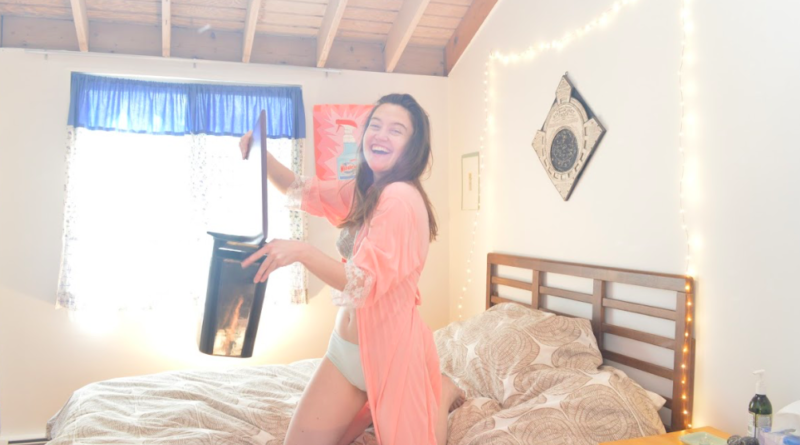INTERVIEW: FRIGID NY Festival presents new one-woman show ‘Driver’s Seat’
Photo: Ellie Brelis writes and performs in Driver’s Seat at the FRIGID New York Festival. Photo courtesy of the artist / Provided by Emily Owen PR with permission.
Ellie Brelis’ new show, called Driver’s Seat, is set to premiere at the FRIGID New York Festival Friday, Feb. 18, with performances continuing at Under St. Marks on select dates until Wednesday, March 2. In the play, which is based on true events, Brelis presents a story about living with a disability, a mental health crisis, heartbreak, coming out as queer and learning how to drive — all set amidst the COVID-19 pandemic, according to press notes.
Driver’s Seat depicts dark moments in the life of its protagonist, but there is humor throughout the evening as well. Brelis is both the writer and performer of the one-woman show, and this is the first produced play by the Emerson College graduate. Her theater credits include New York Stage & Film, Powerhouse Theater, Naked Angels, Martha’s Vineyard Playhouse, Central Square Theater, Underground Railway Theater and Newton Nomadic, according to her biography.
Recently Hollywood Soapbox exchanged emails with Brelis about Driver’s Seat, which is directed by Skye Murie. Questions and answers have been slightly edited for style.
How long has Driver’s Seat been in development?
I started writing Driver’s Seat in July 2020 when I was hospitalized at a psychiatric institution for 12 days. It was an experience unlike anything I had ever gone through, and I didn’t want to forget it, so I wrote. I began chronicling my treatment journey from there and turned it into Driver’s Seat. The first person who ever heard, read or saw any of Driver’s Seat was actually my therapist. I wrote the first draft during six months of treatment, and then put the script away for a while and didn’t look at it. I got some feedback, started rewriting, editing and revising, and eventually I got it to the product that it is today.
What can audience members expect from the show?
Hopefully to laugh a little! But there are definitely some uncomfortable moments mixed in there. The show goes to some dark places, but I definitely like to poke fun at myself and laugh at how truly unhinged I was in 2020.
The story is “based on true events.” How autobiographical is the show?
The show is completely autobiographical. It’s about my heartbreak, my mental illness, my mental health crisis, my queerness, and of course, my fear of driving. Everything that happens in the show happened in real life. It’s a little scary that there’s not any fictionalized elements to the show because it really is just me up there being myself and sharing my story.
It’s a little embarrassing to share my own story. It makes me feel so self-involved, but when I was hospitalized and going through treatment, I wished other people shared their stories with mental illness and treatment so it was a little less scary and lonely.
What do you hope is the ultimate takeaway for the audience? What do you hope is in their mind when they walk home after the show?
I hope people see how complex mental health is, and how major life events like heartbreak, death or a pandemic, can destabilize anyone’s mental health. I want this show to help destigmatize mental illness and treatment for mental illness any way it can. It’s cliché to say, but hopefully people will feel that it’s OK not to be OK.
When I was hospitalized, I had a hard time finding content that depicted mental illness in a way where it wasn’t either romanticized or demonized. There’s so much shame and secrecy surrounding mental illness and psychiatric care. Hopefully this humanizes the experience of living with mental illness.
Your biography says that it’s important to find humor in dark places. Could you expand on that?
To be frank, living with a mental illness absolutely sucks. It’s not fun, it’s really scary, it makes simple things like driving a car feel impossible, it’s isolating, it’s shameful, and it can be really lonely. It can be really dark. There’s no changing that, so why not find ways to laugh along the way? I can’t change my brain or trade in my mental illness. I might as well laugh at the way my brain works instead of beating myself up over it. It’s a form of radical acceptance, which is something I learned in my ridiculously expensive therapy.
I was all sorts of not OK in 2020, and it wasn’t until I was hospitalized that I started to laugh again. I was surrounded by people who could poke fun at themselves, each other, and the situation we were all put in.
Will this show have a life beyond FRIGID?
I really hope so! I’m from Boston, so I would love to produce the show there at some point. I’m hoping to perform with other fringe festivals and just see what happens. You can follow the evolution of Driver’s Seat, and see where we go next, by following me on Instagram. @elliebrelis
By John Soltes / Publisher / John@HollywoodSoapbox.com
Driver’s Seat, written and performed by Ellie Brelis, will play the FRIGID New York Festival from Friday, Feb. 18 to Wednesday, March 2 at Under St. Marks. Please note that this play discusses mental illness and suicidal ideation and may not be suitable for all viewers. Click here for more information and tickets.

